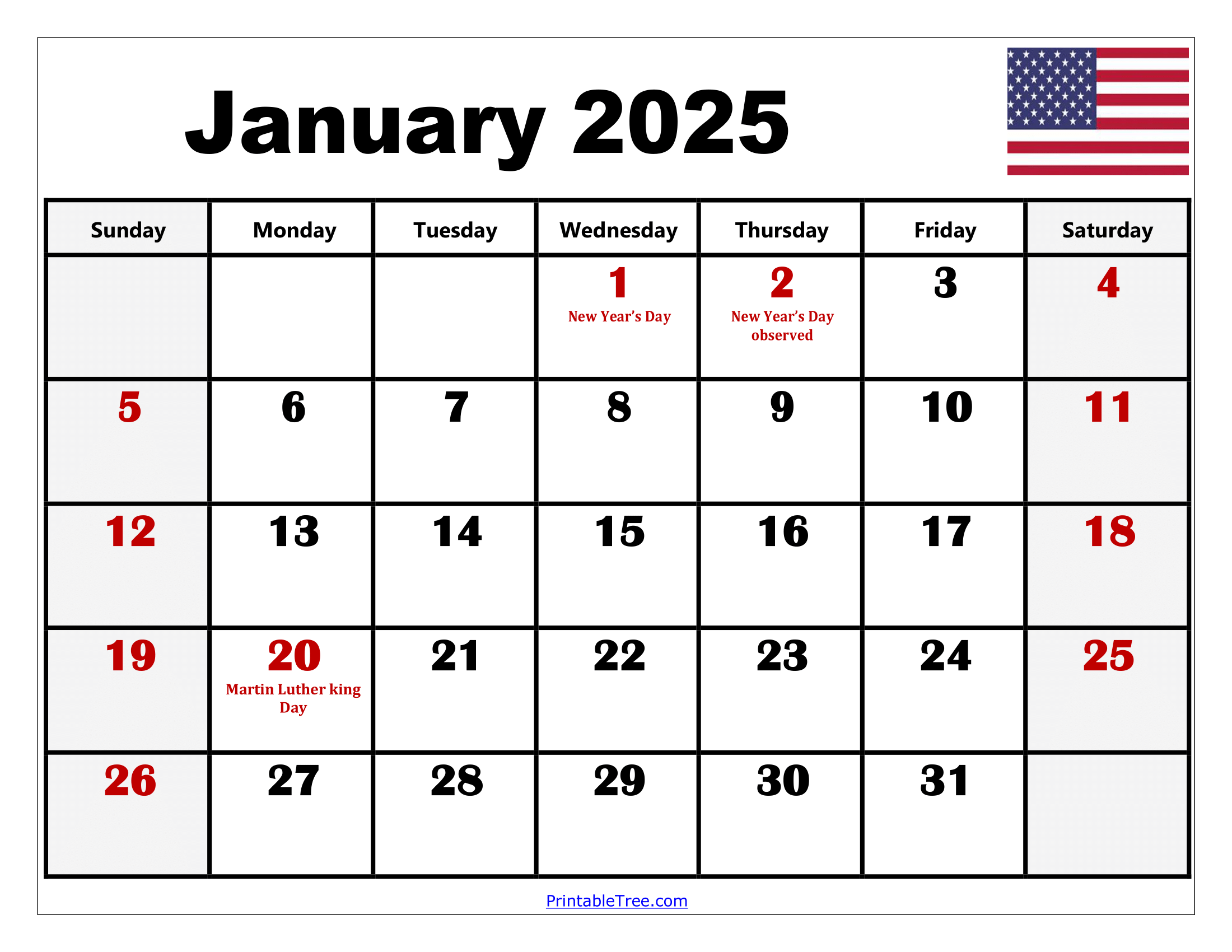A Guide to January 2025 Holidays: Celebrating the New Year and Beyond
A Guide to January 2025 Holidays: Celebrating the New Year and Beyond
Introduction
With enthusiasm, let’s navigate through the intriguing topic related to A Guide to January 2025 Holidays: Celebrating the New Year and Beyond. Let’s weave interesting information and offer fresh perspectives to the readers.
Table of Content
A Guide to January 2025 Holidays: Celebrating the New Year and Beyond

January, the first month of the year, is a time for fresh starts, new beginnings, and, of course, holidays. While the new year itself is a global celebration, January also holds a variety of other holidays, each with its own unique significance and traditions. This comprehensive guide will delve into the notable holidays observed in January 2025, providing insights into their history, cultural relevance, and potential benefits.
Notable Holidays in January 2025:
1. New Year’s Day (January 1):
- Significance: Celebrated worldwide, New Year’s Day marks the beginning of a new year, a time for reflection, resolutions, and looking forward to the future.
- History: The tradition of celebrating the new year dates back to ancient civilizations, with varying dates and customs. The Gregorian calendar, adopted by most of the world, sets January 1st as the first day of the year.
- Cultural Relevance: New Year’s Day celebrations vary widely, from elaborate fireworks displays and parades to quiet family gatherings and personal reflections. Common traditions include making resolutions, setting goals, and enjoying festive meals.
2. Epiphany (January 6):
- Significance: A Christian holiday celebrating the visit of the Three Wise Men to the baby Jesus, Epiphany signifies the revelation of Jesus Christ as the Son of God.
- History: Epiphany is rooted in the biblical story of the Magi, who followed a star to Bethlehem, guided by the divine light to worship the newborn King.
- Cultural Relevance: In many Christian countries, Epiphany is a significant holiday celebrated with church services, processions, and special meals. It is also associated with the tradition of the "Epiphany Cake" or "King Cake," containing a hidden trinket, representing the baby Jesus.
3. World Braille Day (January 4):
- Significance: Celebrated annually on January 4th, World Braille Day honors Louis Braille, the inventor of the braille reading and writing system for the visually impaired.
- History: Louis Braille, a blind French educator, developed the braille system in the early 19th century, revolutionizing literacy for the visually impaired.
- Cultural Relevance: World Braille Day highlights the importance of literacy and accessibility for people with visual impairments. It promotes awareness of braille and its role in empowering individuals with disabilities.
4. World Day of Peace (January 1):
- Significance: Observed annually on January 1st, the World Day of Peace is a global call for peace and non-violence.
- History: Instituted by Pope Paul VI in 1968, the World Day of Peace aims to promote peace, understanding, and cooperation among all people.
- Cultural Relevance: The World Day of Peace encourages reflection on the importance of peace and the need to work towards a more peaceful world. It serves as a reminder of the shared responsibility we all have to foster peace and harmony.
5. Martin Luther King Jr. Day (January 20):
- Significance: A United States federal holiday, Martin Luther King Jr. Day commemorates the life and legacy of Dr. Martin Luther King Jr., a prominent civil rights leader.
- History: Established in 1983, the holiday honors King’s contributions to the fight for racial equality and social justice.
- Cultural Relevance: Martin Luther King Jr. Day serves as a reminder of the ongoing struggle for equality and justice, inspiring continued efforts to dismantle systemic racism and promote social change.
6. Australia Day (January 26):
- Significance: A national holiday in Australia, Australia Day commemorates the anniversary of the arrival of the First Fleet of British ships at Port Jackson, New South Wales, in 1788.
- History: The arrival of the First Fleet marked the beginning of European colonization in Australia, leading to significant cultural changes and impacts on the indigenous population.
- Cultural Relevance: Australia Day is a complex holiday, with celebrations ranging from patriotic events and parades to protests highlighting the historical injustices faced by Indigenous Australians. The day sparks discussions about Australia’s history, identity, and the need for reconciliation.
7. Holocaust Remembrance Day (January 27):
- Significance: Observed internationally on January 27th, Holocaust Remembrance Day commemorates the victims of the Holocaust, a genocide perpetrated by Nazi Germany during World War II.
- History: Established by the United Nations General Assembly in 2005, the day marks the anniversary of the liberation of the Auschwitz-Birkenau concentration camp in 1945.
- Cultural Relevance: Holocaust Remembrance Day serves as a powerful reminder of the horrors of genocide and the importance of fighting against intolerance, discrimination, and hate. It calls for vigilance in preventing future atrocities and promoting respect for human rights.
8. International Day of Commemoration in Memory of the Victims of the Holocaust (January 27):
- Significance: Observed annually on January 27th, the International Day of Commemoration in Memory of the Victims of the Holocaust aims to educate the public about the Holocaust and its lasting impact.
- History: Established by the United Nations General Assembly in 2005, the day coincides with Holocaust Remembrance Day, emphasizing the global significance of remembering the victims.
- Cultural Relevance: The International Day of Commemoration promotes understanding, education, and remembrance, ensuring that the horrors of the Holocaust are never forgotten. It encourages dialogue and critical reflection on the dangers of prejudice, intolerance, and discrimination.
9. International Day of Education (January 24):
- Significance: Celebrated annually on January 24th, the International Day of Education recognizes the crucial role of education in promoting peace, development, and well-being.
- History: Established by the United Nations in 2018, the day highlights the importance of quality education for all, regardless of background or circumstance.
- Cultural Relevance: International Day of Education emphasizes the importance of access to education as a fundamental human right, promoting a more equitable and sustainable future. It encourages investments in education systems, teacher training, and innovative approaches to learning.
10. National Human Trafficking Awareness Day (January 11):
- Significance: Observed annually on January 11th in the United States, National Human Trafficking Awareness Day aims to raise awareness about human trafficking and its devastating consequences.
- History: Established in 2007, the day highlights the need for increased awareness, prevention, and support for victims of human trafficking.
- Cultural Relevance: National Human Trafficking Awareness Day encourages communities to learn about the signs of human trafficking, how to identify and report it, and how to support victims. It emphasizes the importance of collective action to combat this global issue.
11. National Day of Racial Unity (January 16):
- Significance: Observed annually on January 16th in the United States, the National Day of Racial Unity is a call for unity and understanding among people of all races and ethnicities.
- History: Established in 2021, the day aims to promote racial harmony, inclusivity, and respect for diversity.
- Cultural Relevance: National Day of Racial Unity encourages dialogue, empathy, and understanding between people of different backgrounds, working towards a more just and equitable society.
12. National Religious Freedom Day (January 16):
- Significance: Observed annually on January 16th in the United States, National Religious Freedom Day commemorates the signing of the Virginia Statute for Religious Freedom in 1786.
- History: The Virginia Statute for Religious Freedom, drafted by Thomas Jefferson, established the principle of religious freedom for all citizens.
- Cultural Relevance: National Religious Freedom Day celebrates the fundamental right to freedom of religion and its importance in a free and democratic society. It encourages respect for religious diversity and the protection of religious freedom for all.
13. National Cheese Lover’s Day (January 20):
- Significance: A lighthearted holiday observed annually on January 20th, National Cheese Lover’s Day celebrates the joy and indulgence of cheese.
- History: The origin of the holiday is unclear, but it is widely celebrated by cheese enthusiasts around the world.
- Cultural Relevance: National Cheese Lover’s Day provides an opportunity to appreciate the diverse flavors, textures, and culinary uses of cheese, from classic cheddar to exotic blue varieties.
14. National Penguin Day (January 20):
- Significance: Celebrated annually on January 20th, National Penguin Day honors these adorable and charismatic flightless birds.
- History: The holiday is believed to have originated in the United States, promoting awareness and appreciation for penguins.
- Cultural Relevance: National Penguin Day celebrates the unique adaptations and fascinating behaviors of penguins, raising awareness about their conservation and the threats they face.
15. International Day of the African Child (January 16):
- Significance: Observed annually on January 16th, the International Day of the African Child commemorates the children who participated in the Soweto Uprising in South Africa in 1976.
- History: The day was established by the Organization of African Unity in 1991 to honor the children who were killed or injured during the protests against apartheid education policies.
- Cultural Relevance: International Day of the African Child highlights the challenges faced by African children, including poverty, lack of access to education, and exploitation. It calls for improved conditions for children and the promotion of their rights.
16. World Religion Day (January 15):
- Significance: Observed annually on the third Sunday of January, World Religion Day aims to promote understanding and cooperation among different religions.
- History: Established by the Baha’i Faith in 1950, the day encourages interfaith dialogue and collaboration.
- Cultural Relevance: World Religion Day emphasizes the common values and principles shared by different religions, promoting harmony and respect among diverse beliefs.
17. International Day of the Girl Child (January 11):
- Significance: Observed annually on January 11th, the International Day of the Girl Child highlights the importance of empowering girls and promoting their rights.
- History: Established by the United Nations in 2012, the day aims to address the challenges faced by girls worldwide, including discrimination, poverty, and lack of access to education.
- Cultural Relevance: International Day of the Girl Child encourages investments in girls’ education, health, and well-being, promoting gender equality and a more just and equitable world.
18. National Buttercrunch Day (January 14):
- Significance: A lighthearted holiday observed annually on January 14th, National Buttercrunch Day celebrates the delicious candy made from butter, sugar, and nuts.
- History: The origin of the holiday is unclear, but it provides an opportunity to indulge in this sweet treat.
- Cultural Relevance: National Buttercrunch Day encourages appreciation for the simple pleasures of life, indulging in a sweet treat and enjoying the flavors of buttercrunch.
19. National Popcorn Day (January 19):
- Significance: Celebrated annually on January 19th, National Popcorn Day honors this popular snack, enjoyed in various forms.
- History: The origin of the holiday is unclear, but it is widely celebrated by popcorn enthusiasts around the world.
- Cultural Relevance: National Popcorn Day provides an opportunity to enjoy this versatile snack, whether it’s buttered and salted, caramel-coated, or drizzled with cheese.
20. National Disc Jockey Day (January 13):
- Significance: Observed annually on January 13th, National Disc Jockey Day honors DJs, the masters of music and entertainment.
- History: The holiday is believed to have originated in the United States, celebrating the role of DJs in shaping music culture and providing entertainment.
- Cultural Relevance: National Disc Jockey Day recognizes the creativity, skill, and passion of DJs, who curate music playlists, entertain audiences, and contribute to the vibrant world of music.
FAQs about January 2025 Holidays:
Q: Are all these holidays celebrated worldwide?
A: No, some of these holidays are specific to certain countries or regions. For example, Australia Day is celebrated only in Australia, while Martin Luther King Jr. Day is a US federal holiday. However, many holidays, such as New Year’s Day and World Day of Peace, are observed globally.
Q: What are the best ways to celebrate these holidays?
A: The best way to celebrate depends on the holiday and your personal preferences. Some holidays, like New Year’s Day, are often celebrated with family and friends, while others, like Holocaust Remembrance Day, are marked with solemn reflection and remembrance.
Q: How can I learn more about these holidays?
A: You can find detailed information about these holidays online, through libraries, or by contacting cultural organizations. Many websites and institutions offer resources and educational materials related to specific holidays.
Tips for Observing January 2025 Holidays:
- Plan Ahead: For holidays like New Year’s Day or Australia Day, plan ahead for events, gatherings, or travel arrangements.
- Be Respectful: When celebrating holidays, be mindful of cultural sensitivities and avoid insensitive or offensive behavior.
- Learn and Reflect: Use holidays as an opportunity to learn about history, culture, and different perspectives.
- Engage in Community: Participate in local events, volunteer activities, or community gatherings related to the holidays.
- Promote Understanding: Use holidays as a platform to promote understanding, tolerance, and respect for diversity.
Conclusion:
January 2025 is a month filled with a diverse range of holidays, each offering unique opportunities for celebration, reflection, and cultural exploration. From global celebrations like New Year’s Day and World Day of Peace to specific cultural events like Australia Day and Martin Luther King Jr. Day, January provides a chance to engage with various traditions and perspectives. By understanding the significance and cultural relevance of these holidays, we can deepen our appreciation for the diverse tapestry of human experience and contribute to a more inclusive and harmonious world.








Closure
Thus, we hope this article has provided valuable insights into A Guide to January 2025 Holidays: Celebrating the New Year and Beyond. We thank you for taking the time to read this article. See you in our next article!